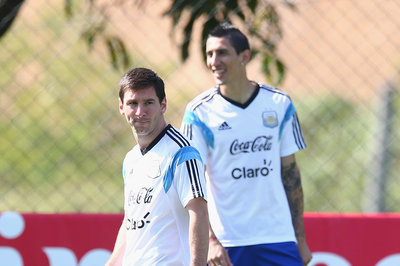Everyone laugh at the Phillies for wanting a lot back for a very valuable asset. Everyone point and laugh.
If you have a favorite team, insert its name into the following headline:
Your Favorite Team signs Cole Hamels for four years, $96 million
That cheap? Just four years? That's almost half the Zack Greinke deal, which is the new going rate for open-market ace-types. You would text friends, giddily. You would line up for a Hamels shirsey the night before it was released, like it was a Playstation 5. The pundits would vault your team a few spots higher than they would have been in the preseason power rankings, which is generally where championships are won.
You would be thrilled.
That's how much money Cole Hamels has left on his contract after this season, with a $20 million team option after that, for good measure -- the $6 million in $96 million is the buyout for that option. Hamels is good. Hamels is paid less than he would get as a free agent. Hamels is valuable. He is extraordinarily valuable. More so than David Price, even
Which is why the reaction to the latest Hamels rumors is both hilarious and surprising. To recap: The Phillies are supposedly asking for a huge return for their ace lefty:
Yet, according to one-ranking official directly involved with the talks, the Los Angeles Dodgers recently asked for Hamels. They were told the price would be three of their top prospects - center fielder Joc Pederson, shortstop Corey Seager and left-handed pitcher Julio Urias.
The Internet reacted the way it does with everything: by laughing at the Phillies. Stupid Phillies, always being stupid. Asking for unrealistic trade returns is no way to build a franchise! Just because the Orioles took the same strategy with Erik Bedard and are in first place six years later because of it, doesn't mean that other teams should get away with it!
So apologies if this seems basic or Negotiation 101, but let's explore the different scenarios for the Phillies.
Ask for little, change demands at last second for a top prospect
This is apparently the dreaded Reverse Zduriencik, as the Mariners GM is becoming famous for reportedly making other teams think the framework to a deal is done, then slowly slinking away. In this scenario, the Phillies ask for the Dodgers' fifth-, sixth-, and seventh-best prospects, then start hinting that they'd totally want Pederson, Seager, and Urias instead once the deal was getting close. This is how I used to trade baseball cards, and it's why I have 593 Alvin Davis rookies instead one Tom Seaver rookie.
This is a dumb strategy. Also, no one uses it.
Ask for two of the team's top prospects, hold firm
In this scenario, the Phillies are more realistic, but still asking for valuable prospects in exchange for their ridiculously valuable pitcher. They do not negotiate; they do not waver. If the Dodgers (or whoever) can't meet the price, the Phillies will be forced to head into the offseason with the most valuable trade chip in baseball, and if they can't work a trade in the offseason, they'll be forced to start the season with one of the better pitchers in baseball.
Not a bad strategy! Except there's a low ceiling. If you don't ask for Grady Sizemore, Cliff Lee, and Brandon Phillips, you'll never get all three. One of the things the hacked Astros database taught us is that teams start high. The conclusion of that piece:
If you're laughing at the prospects the Astros were asking for, that's missing the point. You should be marveling at this example of a deadline strategy, which is something we've never seen in such detail. The Astros were asking for the moon, then they settled on an orbiting satellite with some interesting technology. That's how it works.
When it came to pitchers like Bartolo Colon and Erik Bedard, their old teams were able to extract the three coveted prospects. Probably because that's what they asked for. It's like the Wayne Gretzky quote: "You miss 100% of the field goals you don't swing at." So true.
Ask for three prospects, be willing to negotiate, but realize you have the advantage
Look for the downside. Look hard, be counterintuitive. Unless the Dodgers are so, so offended that they shan't, absolutely shan't, deal with the brutish Phillies ever again, there is no downside. Does the high price drive the Dodgers away, into the arms of the Red Sox or Rays? That's a shame, but Hamels still has tremendous value in the offseason. Also, he's a good, popular pitcher in Philadelphia. There are worse fates.
The downside with that scenario is the Phillies would miss out on the two-prospect deal that they could still get in December, assuming Hamels doesn't get hurt in a freak salon accident over the next two months.
The upside is that a panicking team misses out on Price or Lester at the last second and freaks out. It's happened before. And the Phillies shouldn't settle for less unless they're absolutely smitten with the lesser package. If they're satisfied with that lesser package, they should still ask for more initially. That's because that's how negotiations work (source).
Laugh at the Phillies for other things. Please. Don't laugh at them for asking a lot for Cole Hamels. Turns out that he's good, and the Phillies don't have to trade him before Thursday. They can ask for whatever they want.
from SBNation.com - All Posts http://ift.tt/1zvUk1q








0 commentaires:
Enregistrer un commentaire